- Home
- Kazuo Ishiguro
When We Were Orphans Page 9
When We Were Orphans Read online
Page 9
“I’m sorry, Puffin. Neither Lady Andrews nor Mrs. Callow appreciates the company of children. It’s a pity. You might well have learnt some important things.”
My father, of course, was not barred from the meetings, but there seemed to exist an understanding that he too should refrain from attending them. It is hard for me now to say which, if either of them, was responsible for this state of affairs; but certainly, there was always an odd atmosphere at breakfast on those Saturdays a meeting was to take place. My mother would not actually mention the meeting itself to my father, but would regard him throughout the meal with an air almost of disgust. For his part, my father would become infected by a forced joviality which would grow throughout the morning right up until when my mother’s guests began to arrive. Uncle Philip was always among the first, and he and my father would chat for a few minutes in the drawing room, laughing a lot. Then as more guests arrived, my mother would come and take Uncle Philip away into a corner, where they would confer solemnly about the coming meeting. It was always at around this point that my father would absent himself, usually by going up to his study.
On that day I am recalling, I remember I heard the visitors starting to leave at the end of the meeting, and went out into the garden to await my mother—who I assumed would, as usual, emerge before long to commandeer my swing, singing all the while in her wonderfully carrying tones. When after a time there was no sign of her, I went into the house to investigate, and coming into the library saw that the doors of the dining room were now ajar; that the meeting had indeed broken up, but that Uncle Philip and my mother were still there, deep in discussion at the table, papers strewn before them. And then my father appeared behind me, no doubt also believing the morning’s business to be over. On hearing the voices from the dining room, he stopped and said to me:
“Oh, they’re still here.”
“Just Uncle Philip.”
My father smiled, then drifted past me into the dining room. Through the doors I could see Uncle Philip rising to his feet, and then I could hear the two men laughing loudly together. A moment later my mother emerged looking somewhat annoyed, her documents gathered in her arms.
By then it was past noon. Uncle Philip stayed for lunch and there was more good-humoured laughter. Then, as we were finishing our meal, Uncle Philip made his suggestion: why did we not all go down to the racecourse for the afternoon? My mother thought about this and declared it an excellent idea. My father too said he thought it a fine idea, but he would have to be excused on account of the work awaiting him in his study.
“But by all means, darling,” he said, turning to my mother, “why don’t you go along with Philip? It’s turning into the most splendid afternoon.”
“Well, you know, I rather think I might,” my mother said. “A little excitement might do us all some good. Christopher too.”
And at that moment they all looked at me. Although I was then only nine years old, I believe I read the situation with some accuracy. I knew of course that I was being offered a choice: to go out to the racecourse or to stay at home with my father. But I believe I grasped also the deeper implications: if I chose to stay in, then my mother would decline to go to the racecourse solely in Uncle Philip’s company. In other words, the outing depended on my going with them. Moreover I knew—and I did so with a calm certainty—that at that moment my father was desperately wishing us not to go, that for us to do so would cause him huge pain. It was not anything in his manner that suggested this to me, but rather what I had—perhaps unwillingly—absorbed over the preceding weeks and months. Of course, there were many things I did not understand at all in those days, but this much I saw with great clarity: at that instant, my father was entirely depending on me to save the situation.
But perhaps I did not understand enough. For when my mother said: “Come on, Puffin. Hurry and get your shoes on,” I did so with conspicuous enthusiasm, an enthusiasm I manufactured for show. And I can remember to this day my father seeing us to the front door, shaking hands with Philip, laughing and waving us off as the carriage took my mother, Uncle Philip and me away on our afternoon’s outing.
THE ONLY OTHER MEMORIES to have remained distinct from that autumn also concern my father: namely, those curious instances of his “boasting.” My father was always modest in his manners and found boastfulness in others embarrassing. This is why it struck me at the time as so odd to hear him talk in the way he did on a number of separate occasions around that time. These were all small instances which caused me only mild surprise, but they have none the less remained in my memory over the years.
There was the moment, for example, when at the dinner table he said quite suddenly to my mother:
“Did I tell you, darling? That fellow came back to see me, that representative from the dock workers. Wanted to thank me for all I’d done for them. Spoke jolly good English too. Of course these Chinese always speak very effusively, these speeches of theirs have all to be taken with a pinch of salt. But you know, dear, I had the distinct impression he meant it. Said I was their ‘honoured hero.’ How do you like that? Honoured hero!”
My father laughed, then watched my mother carefully. She went on eating for a moment, then said:
“Yes, darling. You’ve told me already.”
My father looked a little deflated, but then the next second he smiled cheerfully again and said with another laugh: “So I have!” Then turning to me, he said: “But Puffin here hasn’t heard it yet. Have you, Puffin? Honoured hero. That’s what they’re calling your father.”
I cannot remember what any of this was about, and I probably did not much care even at the time. I have remembered the episode only because, as I have said, it was so uncharacteristic of my father to talk of himself in this way.
Another incident of this sort occurred one afternoon my parents and I were going to the Public Gardens to listen to the brass band. We had just stepped out of our carriage at the upper end of the Bund, and my mother and I were gazing across the wide boulevard towards the gateway into the gardens. It was a Sunday afternoon and I remember the pavements on both sides being filled with finely dressed promenaders enjoying the breeze from the harbour. The Bund itself was busy with carriages, motor cars and rickshaws, and my mother and I were preparing to cross it, when my father, having paid our driver, came up behind us and said suddenly and quite loudly:
“You see, darling, they know now at the firm. They know now I’m not one to back down. Bentley knows it, for one. Oh yes, he jolly well knows it now!”
As on that occasion at the dinner table, my mother initially gave no sign of having heard. She took my hand and we made our way across the traffic towards the gardens. “Does he really?” was all she murmured under her breath as we reached the other side.
But that was not quite the end of the matter. We went into the Public Gardens and for a while, like every other family who went to the gardens on a Sunday afternoon, we strolled around the lawns and flower beds greeting friends and acquaintances, stopping occasionally for a short chat. I would sometimes see boys I knew—from school or from my piano lessons at Mrs. Lewis’s—but they were, like me, walking beside their parents on their best behaviour, and we would acknowledge one another only shyly, if at all. The brass band would start to play at half past five on the dot, and although everyone knew this, most people would wait until the horns came drifting across the grounds before making a move towards the bandstand.
We were always late to set off, so that the seats would all be taken by the time we arrived. I did not mind this so much, since it was around the bandstand that we children were allowed a looser leash, and I too would sometimes mingle and play there with the other boys. On that particular afternoon—it must have been well into the autumn for I remember the sun already low over the water behind the bandstand—my mother had moved a few paces away to talk with some friends standing nearby, and after several minutes of attending to the music, I asked my father’s permission to go over to some American boys I k
new playing on the outer fringe of the crowd. He went on gazing at the band and did not answer, so I was about to ask him again, when he said quietly:
“All these people here, Puffin. All these people. Ask them and they’ll all profess to have standards. But you’ll see as you get older, very few of them really do. Your mother, though, she’s different. She never lets herself down. And you know, Puffin, that’s why she’s finally succeeded. She’s made your father a better man. A much better man. Very well, she may be strict, I don’t need to tell you that, ha ha! Well, she’s been every bit as strict with me as she has with you. And the result is, by golly, I’m a better human being for it. Took a long time, but she managed it. I want you to know this, Puffin, your father is no longer today the same person you saw that time, you know, that time you and Mother burst in on me. You remember that, of course you do. That time I was in my study. I’m sorry you ever had to see your own father like that. Well anyway, that was then. Today, thanks to your mother, I’m someone much much stronger. Someone, I dare say, Puffin, you’ll one day be proud of.”
I understood little of what he was saying, and besides, I had the feeling that if my mother—who was only a little way away—caught any of these words, she would be angry. So I did not really respond to my father. I have a feeling I simply asked him again, after a few moments, if I could go over to join my American friends, and that was the end of the matter.
But over the days that followed, I did find myself thinking about this curious speech from my father, and in particular his reference to some occasion when my mother and I had “burst in” upon him in his study. For a long time, I had no clear idea what he might have been referring to, and I tried in vain to match one recollection or another to his words. Eventually I did settle on one memory from very early in my life, from when I could have been no older than four or five—a memory which even then, when I was nine years old, had already grown hazy in my mind.
MY FATHER’S STUDY WAS on the uppermost floor of the house with a commanding view over the rear grounds. I was not usually permitted to enter it, and in general was discouraged from playing anywhere near it. There was, however, a narrow corridor leading from the landing to the study door, along which a row of pictures hung in heavy gilt frames. These were each precise, draughtsman-like paintings of Shanghai harbour seen from the viewpoint of someone standing on the shore at Pootung; that is to say, all the numerous vessels in the harbour were shown with the great buildings of the Bund in the background. The pictures probably dated back at least to the 1880s and my guess is that like many of the ornaments and pictures in the house, they belonged to the company. Now I do not actually remember this myself, but my mother often told me how, when I was very young, she and I would stand in front of these pictures and entertain ourselves giving amusing names to the various vessels in the water. According to my mother, I would quickly be in fits of laughter and would sometimes refuse to abandon the game until we had named every visible vessel. If this were so—if we were really in the habit of laughing boisterously throughout this game of ours—then almost certainly we would not have come up to amuse ourselves in this way while my father was working in his study. But when I thought further about my father’s words at the bandstand that day, I began to remember an occasion my mother and I had indeed been standing together up on that attic floor, for all I know playing this game of ours, when she suddenly stopped and became very still.
My first thought was that I was about to be scolded, perhaps for something I had just said which had displeased her. It was not even unheard of for my mother to switch moods abruptly in the midst of a harmonious exchange and scold me for some suddenly remembered misdemeanour committed earlier in the day. But as I fell silent in readiness for just such an explosion, I realised she was listening. Then the next instant she had turned and pushed open with great suddenness the door to my father’s study.
I caught a glimpse past my mother’s frame of the inside of the room. My abiding image is of my father slumped forward over his bureau, his face covered in perspiration and contorted with frustration. It is possible he was sobbing and it was this sound that had caught my mother’s attention. In front of him, all over his desk, there were papers, ledgers, notebooks. I noticed—I believe I followed my mother’s gaze—more papers and notebooks on the floor, as though he had hurled them there in a temper fit. He was looking up at us, startled, and then the next moment he said in a voice that rather shocked me:
“We can’t do it! We’ll never get back! We can’t do it! You’re asking too much, Diana. It’s too much!”
My mother said something to him under her breath, no doubt some reprimand to make him pull himself together. My father did collect himself a little at this point and, glancing past my mother, looked at me for the first time. But almost instantly his face creased again with despair and, turning to my mother, he said again, shaking his head helplessly:
“We can’t do it, Diana. It’ll be the ruin of us. I’ve looked at everything. We’ll never get back to England. We can’t raise enough. Without the firm, we’re simply stranded.”
Then he seemed to lose control again, and as my mother began to say something else—something in her quiet, angry voice—my father began to shout, not so much at her as at the walls of his study:
“I won’t do it, Diana! My God, who do you take me for? It’s beyond me, you hear? Beyond me! I can’t do it!”
Possibly at this point my mother closed the door on him and led me away. I have no further memory of the episode. And of course, I cannot be sure of the exact sentiments, let alone the exact words, my father was uttering that day. But this is how, admittedly with some hindsight, I have come to shape that memory.
At the time, it was simply a bewildering experience for me, and although I probably found it interesting that my father should, like me, have moments of crying and shouting, I did not much ask myself what it had all been about. Besides, when I next saw my father he was his normal self again, and for her part my mother never alluded to the incident. If my father had not, years later, made that curious speech beside the bandstand, I would probably never have dredged up this memory at all.
But as I say, apart from these curious little episodes, there is little that seems worth remembering from that autumn and the dull winter that followed it. I was listless for much of that period and was delighted when one afternoon Mei Li quite casually gave me the news that Akira had returned from Japan, that at that very moment, in the drive next door, his luggage was being unloaded off the motor car.
CHAPTER 7
AKIRA, I WAS DELIGHTED to learn, had returned to Shanghai not just for a visit, but for the foreseeable future, with plans to resume at his old school in the North Szechwan Road at the start of the summer term. I cannot remember if the two of us celebrated his return in any special way. I have the impression we simply picked up our friendship where we had left off the previous autumn with minimum fuss. I was quite curious to hear about Akira’s experiences in Japan, but he persuaded me it would be childish—somehow beneath us—to discuss such matters, and so we made a show of continuing with our old routines as if nothing had ever interrupted them. I guessed of course that all had not gone well for him in Japan, but did not begin to suspect the half of it until that warm spring day he tore the sleeve of his kimono.
When we played outside, Akira usually dressed much as I did—in shirt, shorts and, on the hotter days, sun hat. But on that particular morning we were playing on the mound at the back of our garden, he was wearing a kimono—not anything special, just one of the garments he often wore around his house. We had been running up and down the mound enacting some drama when he suddenly stopped near the summit and sat down with a frown. I thought he had injured himself but, when I came up to him, saw he was examining a tear on the sleeve of the kimono. He was doing so with the utmost concern, and I believe I said to him something like:
“What’s wrong? Your maid or someone will sew that in no time.”
He did no
t respond—he seemed for the moment to have forgotten my presence entirely—and I realised he was sinking into a deep gloom before my eyes. He went on examining the tear for a few more seconds, then letting down his arm, stared blankly at the earth in front of him as though a great tragedy had just occurred.
“This is third time,” he muttered quietly. “Third time same week I do bad thing.”
Then as I continued to gaze at him somewhat baffled, he said: “Third bad thing. Now mother and father, they make me go back Japan.”
I could not, of course, see how a small tear in an old kimono could bring such consequences, but I was for the moment sufficiently alarmed by this prospect to crouch down beside him and urgently demand an explanation for his words. But I could get little more out of my friend that morning—he grew increasingly sulky and closed—and I seem to remember our parting not on the best of terms. Over the following weeks, however, I gradually discovered what had lain behind his odd behaviour.
From his very first day in Japan, Akira had been thoroughly miserable. Although he never admitted this explicitly, I surmised that he had been mercilessly ostracised for his “foreignness”; his manners, his attitudes, his speech, a hundred other things had marked him out as different, and he had been taunted not just by his fellow pupils, but by his teachers and even—he hinted at this more than once—by the relatives in whose house he was staying. In the end, so profound was his unhappiness, his parents had been obliged to bring him home in the middle of a school term.
The thought that he might have to return again to Japan was one that haunted my friend. The fact was his parents missed Japan badly and often talked of the family returning there. With his older sister, Etsuko, not at all averse to living in Japan, Akira realised he was alone in wishing the family to remain in Shanghai; that it was only his strong opposition to the idea that prevented his parents packing their things and sailing for Nagasaki, and he was not at all sure how much longer his preferences could expect to take precedence over those of his sister and parents. Things were very much in the balance, and any displeasure he incurred—any misdemeanour, any falling off of his schoolwork—could tip the scales against him. Hence his supposition that a small tear in a kimono sleeve might easily produce the gravest of consequences.

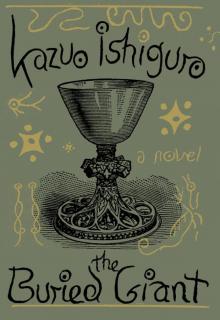 The Buried Giant
The Buried Giant Never Let Me Go
Never Let Me Go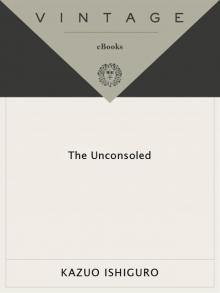 The Unconsoled
The Unconsoled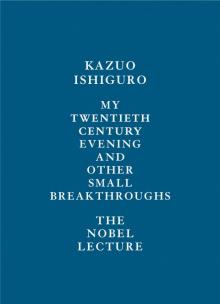 My Twentieth Century Evening and Other Small Breakthroughs: The Nobel Lecture
My Twentieth Century Evening and Other Small Breakthroughs: The Nobel Lecture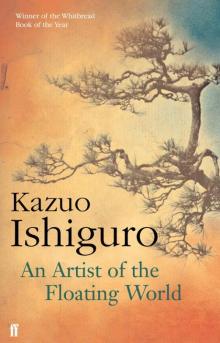 An Artist of the Floating World
An Artist of the Floating World The Remains of the Day
The Remains of the Day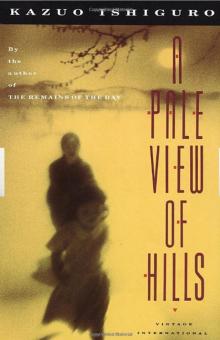 A Pale View of Hills
A Pale View of Hills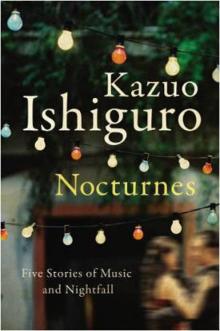 Nocturnes: Five Stories of Music and Nightfall
Nocturnes: Five Stories of Music and Nightfall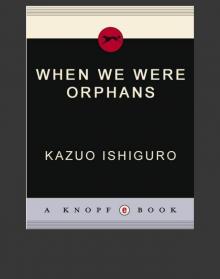 When We Were Orphans
When We Were Orphans Klara and the Sun
Klara and the Sun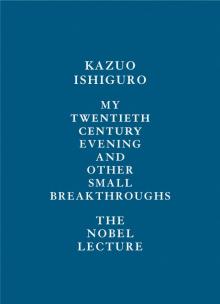 The Nobel Lecture 2017
The Nobel Lecture 2017